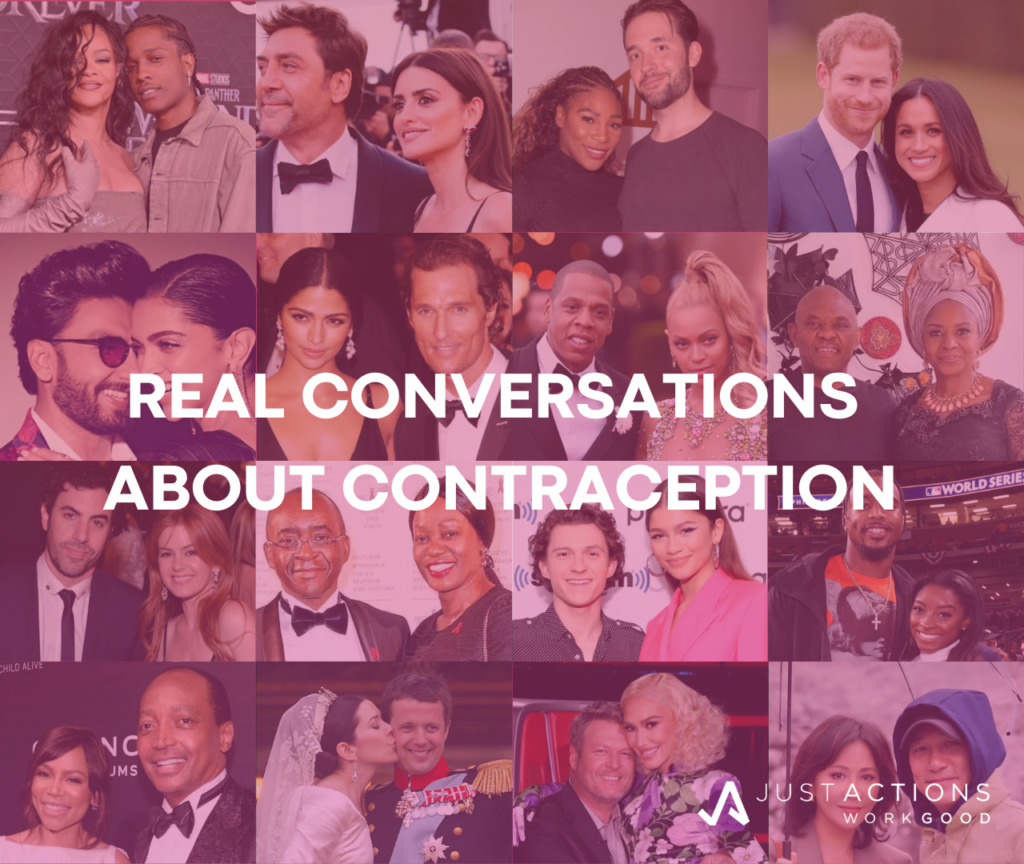Real conversations about contraception
Real couples talk about contraception many times in the course of a relationship, but these conversations are kept behind closed doors. It is governments and large organizations who dominate the public discussion about contraception and it bears no resemblance to the way couples talk to each other about one of the most important decisions in their lives. As a result, the public, and particularly young people, are alienated from the discourse on contraception and disconnected from the current movement to help women and girls who want to, but who can’t, exercise control over their fertility because they have limited or no access to contraception.
Imagine if we could change that?
What if the world’s most successful and beloved couples agreed to be filmed talking to each other about contraception? Imagine Michelle and Barack Obama talking to each other about who first raised the issue, how that first conversation went, what methods they like and don’t like, how they decide what to use and who decides. Or Prince Harry and Meghan Markle? Would they admit to ever arguing about contraception and talk about how they resolved the conflict? Would they reveal where they get their contraceptive information from and how they feel about couples who can’t get access to contraception; who can’t even talk about it together? And what would they say to each other about how their lives and their relationship would be different, if they had never been able to use contraception?
Imagine if this entire conversation was unscripted and captured on film, so that its honesty and authenticity was beyond question? It’s hard to imagine, I agree, but I would bet that by allowing the world to watch the most inspiring couples have the contraception conversation, hundreds of millions of women and girls, and men and boys, would feel like they had been given permission to do the same. And that’s exactly the kind of environment we need now, to normalize a taboo subject and unlock the power of contraception to save lives and improve the quality of life for the hundreds of millions of girls and women who will never reach their full potentials if they cannot control if and when they get pregnant.
Despite more than a decade of initiatives to increase global modern contraception coverage, less than half (48%) of the world’s women are protected against the risks of an unplanned pregnancy and a massive 121 million – nearly half of all pregnancies – are unplanned each year. Forty-two out of every 1,000 teenage girls give birth each year and 19,000 will die as a result. Teen deaths in childbirth are the second leading cause of death for girls aged 15 to 19. Every day 786 women are dying in childbirth – 287,000 each year. Lack of reproductive freedom is one of the reasons just 47% of women are able to work for pay – lower than in the 1990s – a fact that holds back not only economic growth, but also health, education, and even peace and security gains.
We need to try new approaches
So why not create a new campaign — Real Conversations About Contraception — and engage our most beloved couples — those who are immediately recognized all over the world, who are highly successful in their chosen fields, and influential among young people everywhere. Couples like Rihanna and A$AP Rocky, Beyoncé and Jay Z, and Prince Harry and Meghan Markle. And let’s also invite the couples who command national audiences in the regions where lack of access to contraception is contributing to tragically high numbers of teen mothers and maternal and child deaths — couples like Deepika Padukone and Ranveer Bhavnani from Asia and Strive and Tsitsi Masiyiwa from Africa. The campaign could enlist award-winning Hollywood, Bollywood, and Nollywood talent to film these couples speaking to each other about contraception in their own intimate, family settings — in their own homes.
The world’s best creative agencies could build a global campaign around these videos and distribute them widely on social media allowing the world to watch, comment and share. You could even invite couples everywhere to turn their phones on each other and record and upload their own “real conversations about contraception.” Imagine hundreds of thousands of conversations ranging from celebrity couples in Los Angeles to teen couples in Lagos to married couples in Lahore all having what amounts to the same, essential conversation.
Who can make this happen?
What if this campaign partnered with the groups who are using technology to get contraceptive information, products and services directly to women? The hundreds of millions of women in the world who want to use modern contraception but can’t get it represent one of the largest, under-served markets in the world. Pharmaceutical companies are producing ever better contraceptive products – longer lasting and with fewer side-effects – while for-profit and not-for-profit startups like nurx, Lemonaid Health, Women on Web, Muso Health, and more, are finding ways to deliver contraception and safe abortion right to a woman’s doorstep. The vast private sector is still a relatively untapped source in the fight for fertility control.
It will take bold and brave champions to bring this idea to life. Don’t underestimate for a minute the forces that will line up against the idea of unleashing a global wave of “real conversations about contraception.” But above all it will depend on some very extraordinary couples with a deep commitment to gender equality, the health and development of girls and the future of our planet to step up and agree to leverage their love to liberate one of life’s most essential conversations and return it to the women and girls, and men and boys, who need to be able to have it. The stakes are high. The conversation about contraception, particularly for women and girls, can mean the difference between life and death, sickness and health, and a future worth living.
Updated January 2024



